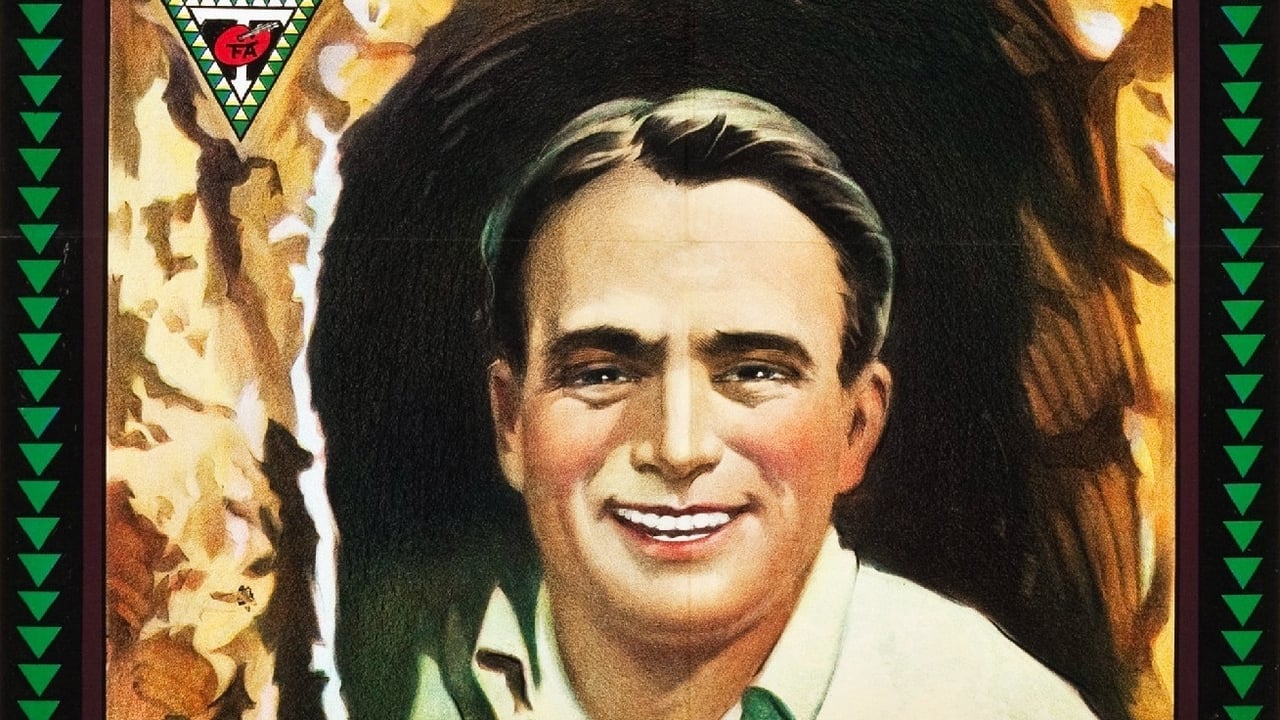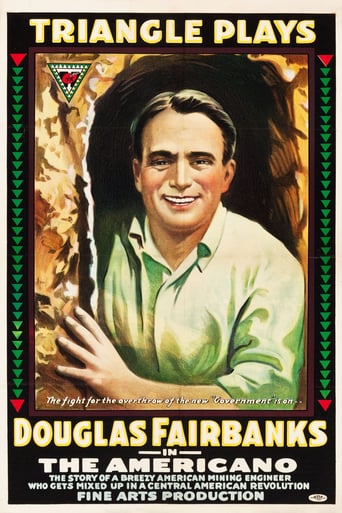



What makes it different from others?
Very well executed
It’s fine. It's literally the definition of a fine movie. You’ve seen it before, you know every beat and outcome before the characters even do. Only question is how much escapism you’re looking for.
View MoreIf you're interested in the topic at hand, you should just watch it and judge yourself because the reviews have gone very biased by people that didn't even watch it and just hate (or love) the creator. I liked it, it was well written, narrated, and directed and it was about a topic that interests me.
View MoreIn "The Americano", for the first time Doug Fairbanks introduces some political contents in one of his wonderful early comedies (the last one he made for Triangle) - something he would repeat later on in "Reaching for the Moon", and in the legendary first United Artists picture "His Majesty, the American". And strange as it sounds, this quite intricate story about the economical problems of a small Caribbean Republic called Paragonia goes together JUST fine with Doug's usual comical and athletic antics! He plays Blaze Derringer, a young American mining engineer, on whom his boss calls to go to Paragonia, where a political dispute has developed about the mines, on which the economy of the small republic obviously depends: the scheming and dangerous Minister of War opposes their re-opening under the supervision and with the capital of US companies; and so the Prime Minister himself goes to see the company's boss in New York, and he puts all his hopes into the capable young engineer - but Blaze, when his boss shows him on the map where Paragonia is, only shakes his head and explains: 'Too far from Brooklyn!' Fortunately, the President's pretty young daughter Juana has also come along with the Prime Minister, and she waits outside the office - and as soon as our young hero sets eyes on her, he changes his mind, of course... And so he heads for the 'idyllic' Caribbean island - but very soon he finds out that the conditions aren't at all idyllic at the moment: while the Prime Minister was away, the mean General has arrested the President, Juana's father, and is now trying to drive all US businessmen out of the country by force - and Juana herself has also become a prisoner in her own house; which gives Dashing Doug a wonderful opportunity to save a damsel in distress AND at the same time restore peace and order in 'Paragonia'! So here we can witness with what innocent eyes US Americans saw the political conditions in other countries before they entered WWI - yes, it DOES take a little bit of effort by today's movie fans to place themselves back into time, as far as 1916; but once you get into the spirit, it's REALLY worth to 'live' those days, before the War, before Prohibition, before Censorship... And as for 'Whitey', the African American who's the only one from the company who's stayed in Paragonia, and with whom Doug of course becomes friends immediately ('We Americans have got to stick together', he says - a very early example where race in a Hollywood movie was of NO importance at all!); yes, he's played by a white man appearing in black-face - but that wasn't regarded as anything offensive by the black population either: anyway, didn't Swedes play Chinese later on, for example, and Austrians Japanese? And another fact is that Native American Charles Stevens, one of Doug's best friends in real life, plays quite a vital role here: that of distinguished 'General Gargaras', whom Juana is to marry by force after orders from the mean Minister of War...So this isn't only an unusual film in MANY ways, but it also provides GREAT entertainment throughout, with a clever plot, first-class directing and photography - and of course, marvelous performances by all involved! And it finds a perfect balance between political drama and romantic comedy; a RARE jewel indeed...
View MoreIn this Douglas Fairbanks vehicle, "The Americano", his last for Triangle, our American hero rescues a small Caribbean kingdom, Paragonia, from a military coup. The employment of the people of Paragonia appears to rest mostly on an American company's exploitation of their mines, and this is the source of the revolutions. Fairbanks decides to work there after he sees the Presidente's daughter. "The Americano" features more intrigue than the usual Fairbanks fare and less comedy, but it's still a decent entry in the star's oeuvre. The best part of this one is probably that it has so much plot, which isn't unusual for other pictures, but was for Fairbanks's comedies, especially when it wasn't driven by the main character. It is, however, similar to the scenarios for Fairbanks's later films "Reaching for the Moon" (1917) and "His Majesty, the American" (1919).Unfortunately, Tom Wilson, a Caucasian character actor, plays a role in blackface, although it's not nearly the most offensive portrayal of this kind that I've seen (e.g. Wilson seems to have first worn blackface in "The Birth of a Nation").(Note: I viewed a rather poor but viewable print, which included a few jumpy frames, and there was no musical accompaniment. Additionally, I assume "The Americano" originally had blue tinting for its night scenes, as that was the standard day-for-night strategy of filmmakers back then. The version I saw, however, was entirely black and white. Interestingly, for indoor night or otherwise dark scenes, the filmmakers used low-key lighting.)
View MoreIn the days before the Great War (aka World War) I), in the Caribbean Sea, the tiny nation of Paragonia nestled. Soon, the "jewel set in the girdle of the earth" would need All-American Douglas Fairbanks to settle unrest.In the spring of 1910, a New York mining company's contract with the Republic comes up for renewal. Paragonia's "Minister of War" Carl Stockdale (as Salsa Espada) is alone in opposing the renewal; he thinks Americans are "pigs", and wants to rule the Republic. President Spottiswoode Aiken (as Hernando de Valdez) and Premier Tote du Crow (as Alberto de Castille) have their way, and the contract is signed. Meanwhile, Mr. Aiken's comely daughter Alma Rubens (as Juana de Valdez) attracts suitors like Charles Stevens (as Colonel Gargaras).In New York City, young mining engineer Douglas Fairbanks (as "The Americano") is offered a job in Paragonia. At first, Fairbanks refuses ("Too far from Brooklyn!") -- but, when he sees fetching Ms. Rubens visiting the American Mining Company office, he is smitten. Upon arrival, Fairbanks finds the dictatorial Mr. Stockdale has taken over the country, and thrown its popular president in prison. Moreover, Rubens is being forced into an unhappy marriage This was the last, and not the best, of the Fairbanks "Triangle" films supervised by D.W. Griffith. The acclaimed director's influence can be seen occasionally, in the film's relatively elaborate structure, and characterizations. For example, Reubens is introduced petting a bird. And, while it wasn't only Griffith who employed offensive black-faced characters like Tom Wilson (as Harold Armitage "Whitey" White), he created this role for Wilson (who pets his lucky rabbit's foot). The Mexican locale is a highlight. *** The Americano (12/24/16) John Emerson, D.W. Griffith ~ Douglas Fairbanks, Alma Rubens, Carl Stockdale
View More... and that's where the Americano comes in. He has to go to the Central American country of Paragonia along the cliffs of the Caribbean to teach the population how to use modern machines to mine whatever it is they mined there in 1910. The film was made in 1916 and hearkened back to those days before the great war made all the other wars squabbles... Douglas Fairbanks dances about and helps save the day when the Paragonian Presidente travels to New York to appeal to the mining company to send someone to help his economy flourish. Good thing he brought his daughter because Douglas would never have left Brooklyn were it not for the sight of her.While in New York a military coup transforms his country into a military regime. Daughter rushes back with father, warning Douglas not to follow, which he does. The film anticipates the HBO Pancho Villa film, "And Starring Pancho Villa as Himself."
View More